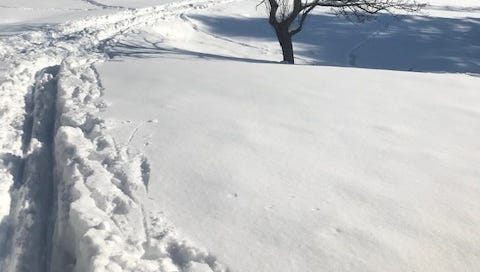At the end of 2019, the Oxford English Dictionary phrase of the year was “climate emergency.” But here, at the end of 2020, for the first time ever, the lexicologists at the OED are flummoxed. There are so many new words and new usages of words that they have announced they are unable to “neatly accommodate” the year’s seismic shifts in language in one single word or phrase. Instead, they are leaving us with a list. Here are some of the words: “shown through usage evidence to reflect the ethos, mood, or preoccupations of the passing year, and have lasting potential as a term of cultural significance:”
mask-shaming, bubble, Black Lives Matter, BLM, lockdown, impeachment, conspiracy theory, anthropause, social isolation, doomscrolling, autocracy, R-factor, QAnon
Though at this moment the pandemic is creeping through Cumberland County at such a deadly pace we are no longer in a bubble with our grandchildren, though vaccines are slow to be administered and the result of the election is challenged by 11 Senators and millions are out of work, the news that language has fundamentally changed makes me feel curiously relieved and hopeful. And less alone.
Last year, on January 2, I reached the three-quarter century mark in my life. This birth date, paired as it is with New Year’s, doubly dooms me to the old trope of making resolutions, of reflection on the past and naming hopes for the future. I’d spent a great deal of 2019 focused on the OED word of that year. But despite all of that work assembling in a book the language of Maine poets and artists on the climate crisis, I felt alone with my grief. I felt too few people had awakened, particularly on the political front, to the immediate threat to the planet. I felt like an orphan. This is a snippet of what I wrote a year ago:
January 2, 2019. Orphan. This is the word I have for myself at the end of the year. I am losing Earth, the Great Mother, the Holy Mother. She has soothed me and held me and sung to me, but, she is unwell and dispirited. When I turn to her, when I walk in the forest or beside the ocean or stand on the edge of the salt marshes and wait for the red winged blackbird to call, I am aware both of her beauty and of her frail peril. Where I once believed the Great Mother’s breath would go on filling the world with this teeming wonder of life, I worry about the death of the forests and the salt marshes and the birds. And the millions of her children who will die when her breath can no longer support them.
This year, I no longer feel alone with my grief. I no longer feel like an orphan. The year has offered so many opportunities to exhume the brokenness just under the crust of things, brokenness not yet languaged, only sensed like the scent of smoke in the room at midnight or the rumble and boom of ice while cross country skiing on Moosehead Lake. And too, I see that my grief is not only about the grief of the climate crisis. It is a grief that contains multitudes. The grief of Native Americans, of Blacks, of poor grocery workers and shift workers, of nursing home residents and caregivers. 350,000 deaths from Covid. The list is endless. This year, language now holds these multitudes of griefs which only last year were tongueless, voiceless, waiting for words, for a time in the world.
It is a great relief for me that this seismic shift in language represents a seismic shift in what can be talked about. Like many of you, I grew up in a family with many griefs that were unspoken and unprocessed. In retrospect, I see that the secret kept and the silence maintained around my grandmother’s sudden death from the first pandemic, in 1919, two weeks after my father was born, was a grief he carried and a grief I carried my whole life: without words, without connection, without solace. I felt my father’s searching, his own feeling of being an orphan, but had no language for it. Ultimately, I became a therapist, a person who finds language for the unspoken, for the grief that will not be named.
We are a country with many ungrieved griefs. Sometimes, this is how I see the divisions in our country: between the people who have found language and connection around the many griefs of this time: racial and economic and environmental and the people who have found a different language and different connections around these same factors: QAnon, conspiracies, Make America Great Again.
It is a splendid thing, a great relief, a sort of miracle, that our new President is familiar with grief. With the language and gestures of grief. For he, like Elizabeth Bishop in the poem below, has had much practice. (Apologies to Elizabeth and you for the form, but Substack isn’t poem friendly.)
One Art
The art of losing isn’t hard to master;/ so many things seem filled with the intent/ to be lost that their loss is no disaster.
Lose something every day/ Accept the fluster/of lost door keys/ the hour badly spent/The art of losing isn’t hard to master.
Then practice losing farther, losing faster:/ places, and names, and where it was you meant to travel/ None of these will bring disaster.
I lost my mother’s watch. And look! my last, or/next-to-last, of three loved houses went/ The art of losing isn’t hard to master.
I lost two cities, lovely ones. And, vaster/some realms I owned, two rivers, a continent/I miss them, but it wasn’t a disaster.
—Even losing you (the joking voice, a gesture/ I love) I shan’t have lied. It’s evident/the art of losing’s not too hard to master/ though it may look like (Write it!) like disaster.




